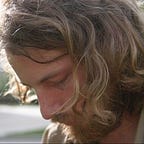In my youth, I idolized the storytellers. Of the few heroes I have, most are writers, or at least eloquent and persuasive masters of speech. During the stand-up comedy boom in the eighties (my childhood), comedians were what I looked up to most—the master storytellers. I remember watching An Evening at the Improv with my father, then trying to repeat the routines back at the playground.
My father could tell a story—more often a joke—as well as anyone I’ve ever known. (While I did inherited his comedic timing, I must have taken after my mother in this regard. I can tell a good joke, if I could only remember it.) He never pushed me to make money, but to create. And it was his love for the storyteller that must have made me want to be a writer myself.
After finishing my last semester of university (carefully planned to be a study abroad), I holed myself up in a one-room apartment in Bangkok, a city chosen mostly because it was easy to be isolated in. And I read. Like an invalid stuck in a hospital bed watches television, so I read—from the moment I awoke, clutching my book as I fell asleep on a thin mat, surrounded by the sounds of heat, and dishes being washed on a balcony.
I discovered Hemingway in a musty used bookstore in Khao Sarn, greedily grabbing a copy of A Moveable Feast that must have been read by a dozen each of Australians, English, and Dutch. I loved his honest storytelling so much I took the chain of busses back many times to find whatever the farang had left behind—not an easy (or comfortable) feat, even for a young man who could speak adequate Thai.
My appetite for reading was ravenous, and eventually the tourist bookstores weren’t cutting it anymore. I flew back home temporarily, mostly to bring back to Thailand many of my collection of school books that I had written about but neglected to actually read. I’d like to think I made up for the lost time in college, which had all but ruined reading for me.
Moving down to the south of Thailand, I actually finished that copy of Atlas Shrugged I was given (except for a few dozen pages of that overindulgent speech at the end). I read The Brothers Karamazov in a few days, a novel that had previously frightened me with its size. I found it surprisingly humorous, and kept seeing it as a movie in my head.
I was probably just suffering withdrawal from my habit of watching films. Having no access to a VCD player, and no television, I discovered screenplays. I would download over Internet cafe dial-up as many scripts as my janky notebook could hold, and read those instead.
I had always been writing during this time, mostly long prose emails to friends, updating them on my little adventures. I wanted to write a book, but a movie script seemed more approachable. I even tried short stories. However, whenever I tried to write any fiction I would inevitably block.
I could easily tell a story which had happened in real life, but was never comfortable telling one I’d made up. So I would set it all aside, tinker with an idea I had for a web app, or design some icon,thinking I’d come back to the writing later. But I just kept getting deeper into bash scripts, ignoring the Hollywood ones. I eventually realized that whatever I kept coming back to must be the right career for me.
With this new wisdom, I returned to the States again, purely for work. California this time—I heard programmers could make good money in Silicon Valley. I did end up writing a book—a tech book—for O’Reilly. There was certainly some storytelling in the chapter headings, maybe more than most books on coding, but I’m still not so sure my strengths are in prose. I like to think I found a way to tell a story my own way…not about software, but with it.
I guess I’ll never get to that novel. Maybe some day, long from now, when I’m old and tired and my mind has long been cleared of tweets and Hacker News…and I’ve forgotten how to code. For now, I’m happy with little vignettes in the products I create. We all have stories to tell, and we should tell them. But we’re not all meant to be novelists.
